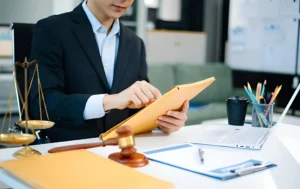Immediate Actions to Ensure Safety
In the moment following a motor vehicle accident, adrenaline and confusion can make it hard to know what to do first. The initial priority is always safety. Begin by checking both yourself and your passengers for injuries, even minor ones, as even a motor vehicle accident that seems minor can cause hidden trauma. If there is anyone unconscious or seriously hurt, call emergency services immediately and avoid moving them unless absolutely necessary, such as when facing fire or another imminent threat. If you’re unharmed and your vehicle isn’t presenting further danger (for example, leaking fuel or sitting in the path of traffic), it’s best to stay where you are until help arrives.
If the motor vehicle accident occurs on a busy road, turn on your hazard lights to alert other drivers. If your car can safely move without causing additional issues or injuries, steer to the shoulder or a safer adjacent area. Remaining in place, however, is often the best option if you’re unsure about moving vehicles or if major injuries are suspected. Always remember that safety comes before everything else, regarding yourself, your passengers, and everyone else at the scene. Swiftly contacting emergency personnel not only brings needed help but also ensures there’s an official record of the incident, which can prove invaluable later on.
Collecting Essential Information at the Scene
After ensuring that everyone is out of immediate harm’s way, the next step is collecting crucial information. This should include the names, contact details, driver’s license numbers, license plates, and insurance information for everyone involved in the accident. Use your phone to take clear, comprehensive photos of the accident scene from various angles. Make sure to capture vehicle damage, position on the road, skid marks, debris, traffic signs, and any distinguishing features in the environment that may have played a role in the crash.
Secure details from bystanders and witnesses as well. Their accounts might be significant if there is any dispute about how the accident occurred. Politely ask for their names and contact information, and make a quick note or voice memo of their versions of events if they are willing to share. Thorough, concise documentation at the scene is a powerful asset. Real-life claims cases often hinge on observations and physical evidence gathered in these first moments, so prioritize accuracy and detail while remaining courteous to others present.
Notifying Law Enforcement and Filing a Report
Regardless of whether your state or province requires a police report for minor fender-benders, involving law enforcement after a collision is usually advantageous. A police officer can provide an unbiased, third-party account of the accident, document critical details, and direct traffic if needed. When you speak with the officer, relay the facts without speculating or placing blame; the report should reflect a clear and objective view of what happened.
Legal requirements about reporting an accident differ depending on where you are, but even in cases where it’s not mandatory—such as when damages appear minor—having an official police report can prevent future headaches. As the National Highway Traffic Safety Administration accident reporting guidelines indicate, this step can help clarify events for insurance, support any legal claims, and serve as essential evidence in complex scenarios. Ultimately, a properly filed report creates a vital record you can reference if any questions arise later in the claims process.
Seeking Medical Attention: Hidden Injuries and Future Concerns
Even if you feel okay initially, some accident-related injuries can hide beneath the surface, showing symptoms only hours or even days later. For example, whiplash, concussions, and certain internal injuries may not be obvious right away. Schedule a thorough check-up with your physician or visit an urgent care center to ensure nothing is missed. Describing even mild discomfort or confusion to the doctor allows for complete documentation and provides reassurance that you’re taking your health seriously.
Medical records are also instrumental if you later develop symptoms requiring ongoing care or need to pursue an insurance claim for reimbursement. Many insurance companies expect prompt evaluation after an accident, and delays in seeking medical attention could compromise potential benefits. If you notice unusual symptoms down the road—like headaches, dizziness, pain, or reduced mobility—return promptly for follow-up care. Listening to your body and acting quickly can make a substantial difference in your recovery.
Notifying Your Insurance Company
Contacting your own insurer soon after the accident is essential, as most policies impose deadlines for reporting. When filing a claim, provide clear, factual details about the incident. You should have already collected critical information at the scene, so have this easily accessible during your call or online submission. Avoid guessing about matters you don’t know, particularly when assigning fault.
Maintain professionalism and stick to the basics, including the crash’s date, time, location, weather conditions, and those involved. If representatives approach you from another involved driver’s insurance company, know that you aren’t required to supply them with a recorded statement immediately. It is often wise to consult with a professional, especially if liability is unclear or you suffer injuries requiring ongoing care. Careful communication prevents misunderstandings and helps safeguard your interests.
Understanding Your Rights and Responsibilities
After an accident, you are entitled to seek repairs, medical care, and—in many cases—compensation for lost income if your injuries interfere with your ability to work. At the same time, you carry obligations, such as cooperating with your insurer’s investigation, submitting necessary paperwork, and meeting legal deadlines for claims and accident reports. Read through your insurance policy or ask your insurer directly about coverage limitations and requirements specific to your situation.
Because every state and country enforces its rules about liability, fault, and personal injury recovery, review your local laws or ask an expert if you’re confused. Knowing your rights and obligations up front reduces the chance of delays or denied claims as you work toward recovery.
When to Seek Legal Guidance
While many minor incidents are resolved directly with insurers, accidents involving significant losses, disputed fault, uninsured drivers, or injuries that require ongoing treatment are situations where professional advice may be in your best interests. Promptly seeking guidance can clarify your rights, explain the process, and help negotiate with insurance adjusters or the parties involved.
If you ever feel overwhelmed, face confusing paperwork, or are offered a quick settlement before all your damages are known, consult a legal professional specializing in car accident recovery. This extra step could prevent costly mistakes as you seek fair compensation for your losses.
Long-Term Considerations: Recordkeeping and Recovery
Healing and rebuilding after an accident takes time, effort, and careful organization. Create a dedicated folder—physical or digital—for all related documents: police reports, medical records, repair invoices, correspondence, and insurance paperwork. These materials form the backbone of any insurance claim or legal matter, and having them at your fingertips prevents last-minute scrambles should additional questions arise months later.
Detailed documentation is your safety net, especially if latent injuries develop or a dispute arises unexpectedly. As claims are processed and your health improves, this organized approach supports your case and helps provide peace of mind, letting you focus your energy on moving forward after the stress of a car accident.
Also Read-257+ Best Basketball Pick-Up Lines to Elevate Your Game








